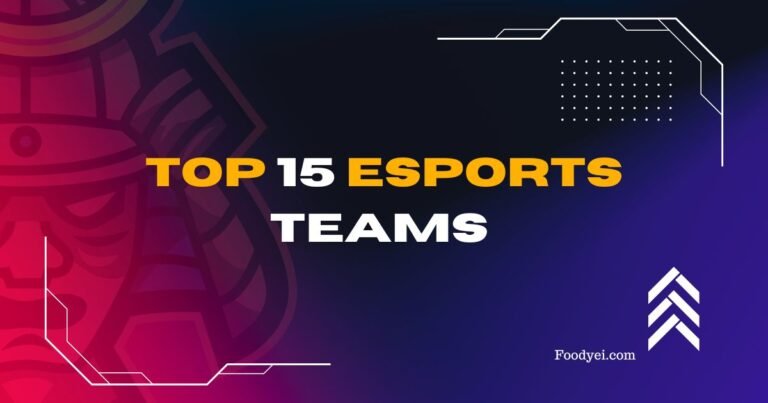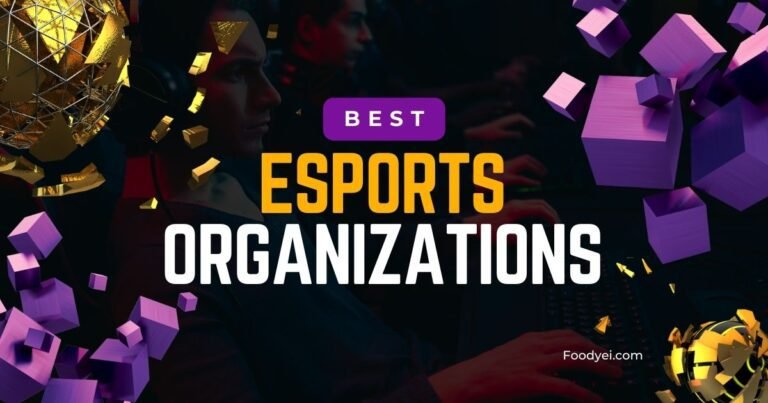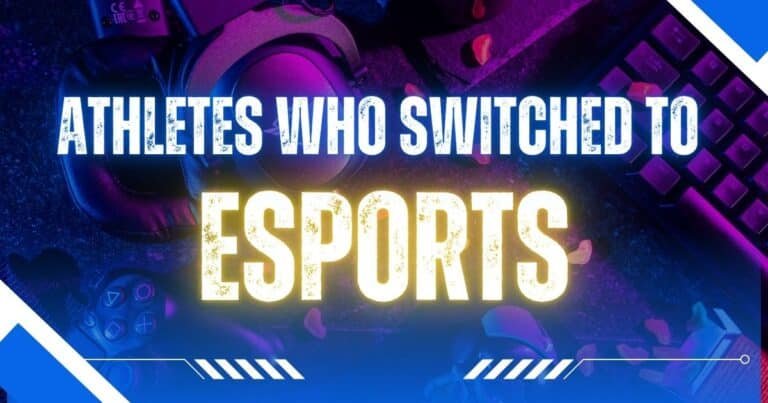Esports, or electronic sports, have gained tremendous popularity and evolved into a global phenomenon. Rapid implementation, strategic gaming, and intense competition engage the audience, making esports one of the most interacting forms of entertainment. Behind the scenes, Esports observers play a key part in making sure every moment of the game is caught and shown correctly. As the competitive gaming industry continues to grow, various roles have emerged to ensure the smooth operation and captivating experience of esports events. Among these essential roles is that of an observer. In this article, we will delve into the responsibilities, significance, and impact of observers in the dynamic realm of esports.
The Role of an Esports Observer
Esports Observers are those with a strong eye for detail and a profound comprehension of the game being played. They operate as the eyes of the audience, tasked with capturing and broadcasting the most thrilling and vital moments of a match. Observers must possess excellent multitasking skills, game knowledge, and technical expertise to fulfill their responsibilities effectively.
Responsibilities of an Esports Observer
The main responsibility and focus of an Esports observer is to provide a good viewing experience for the audience. They accomplish this by following the gameplay closely and switching between perspectives to capture significant events, kills, or game-changing plays. Observers must keep a compromise between showing crucial events and offering an overview of the games.
Ensuring a Captivating Viewing Experience
Esports Observers aim to create an engaging and immersive experience for the viewers. By anticipating critical moments and skillfully controlling the camera, they enhance the audience’s understanding of the game. Observers leverage their knowledge of the game’s mechanics, strategies, and player dynamics to ensure that viewers never miss out on crucial actions.
Observing Gameplay and Key Moments
During a match, Esports observers are responsible for observing and tracking the players’ actions and movements. They employ various techniques, such as free camera movement and first-person perspectives, to capture the intensity and excitement of the gameplay. Observers must possess exceptional situational awareness to anticipate upcoming events and adjust their focus accordingly.
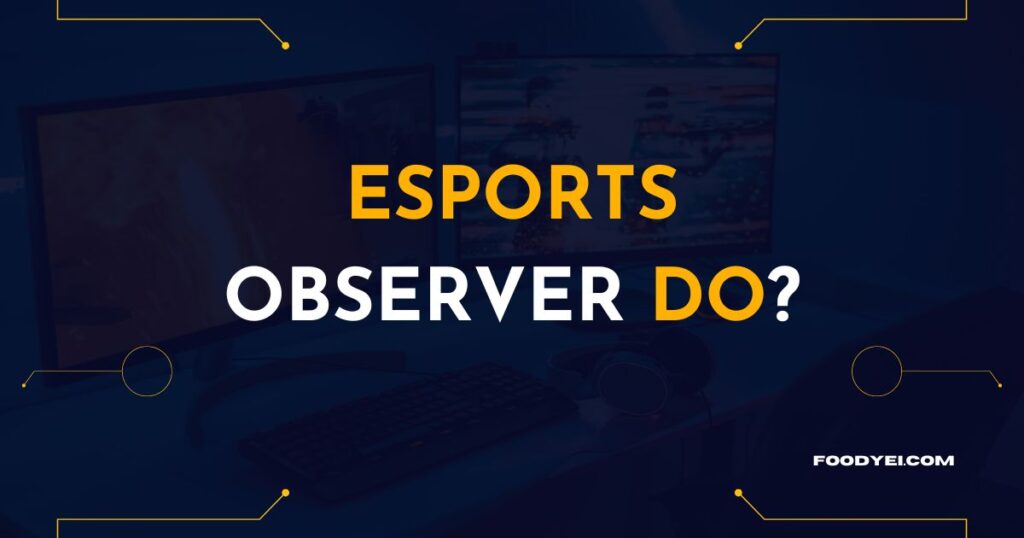
Communicating with the Production Team
Esports Observers work closely with the production team, including directors and producers, to align their camera movements and shots with the overall broadcast plan. Clear and timely communication is vital to ensure that the observer’s footage seamlessly integrates with the live production. This collaboration guarantees a cohesive and synchronized viewing experience for the audience.
Adapting to Different Esports Titles
Esports encompasses a wide array of game genres, each with its unique gameplay mechanics and viewing requirements. Observers must be adaptable and knowledgeable about the specific intricacies of each title they observe. Whether or not it’s an action-packed first-person shooter or a strategy-based multiplayer online war arena, observers must learn to capture the game’s spirit.
Technical Expertise and Tools
Esports Observers utilize advanced tools and technologies to perform their roles effectively. These tools include game-specific observer modes, customizable overlays, and real-time data feeds. Observers must be proficient in operating these tools to enhance the viewing experience and provide valuable insights into the game.
Enhancing Esports Broadcasting
Esports Observers contribute significantly to the quality of esports broadcasting. Their camera work and skillful framing of key moments heighten the excitement and drama for viewers. By showcasing the most impactful plays and player interactions, observers enrich the storytelling aspect of esports broadcasts and help build a passionate and engaged community.
Observer’s Influence on Competitive Integrity
Esports Observers play a crucial role in maintaining the competitive integrity of esports events. Their watchful eyes detect any suspicious or unauthorized actions, such as cheating or rule violations, and report them to the relevant authorities. This ensures fair play and upholds the integrity of the competitive environment.
Collaborating with Casters and Analysts
Observers collaborate closely with casters (commentators) and analysts to provide comprehensive coverage of the matches. Casters rely on observers to deliver real-time action updates and highlight crucial moments for analysis and commentary. This collaboration creates a seamless synergy between the observer’s visual storytelling and the casters’ insightful narration.
Career Path for Observers
Becoming an Esports observer requires a combination of passion, knowledge, and experience. Aspiring observers often start by observing smaller tournaments and gradually build their reputation through their exceptional work. With time, they may have the opportunity to work at larger events and even secure full-time positions with esports organizations.
Challenges and Opportunities
Observers face several challenges in their role, such as managing high-pressure environments, adapting to game updates, and handling unforeseen circumstances during live broadcasts. However, these challenges also present opportunities for growth and innovation. Observers can push the boundaries of their craft by experimenting with new techniques and leveraging emerging technologies.
The Future of Observers in Esports
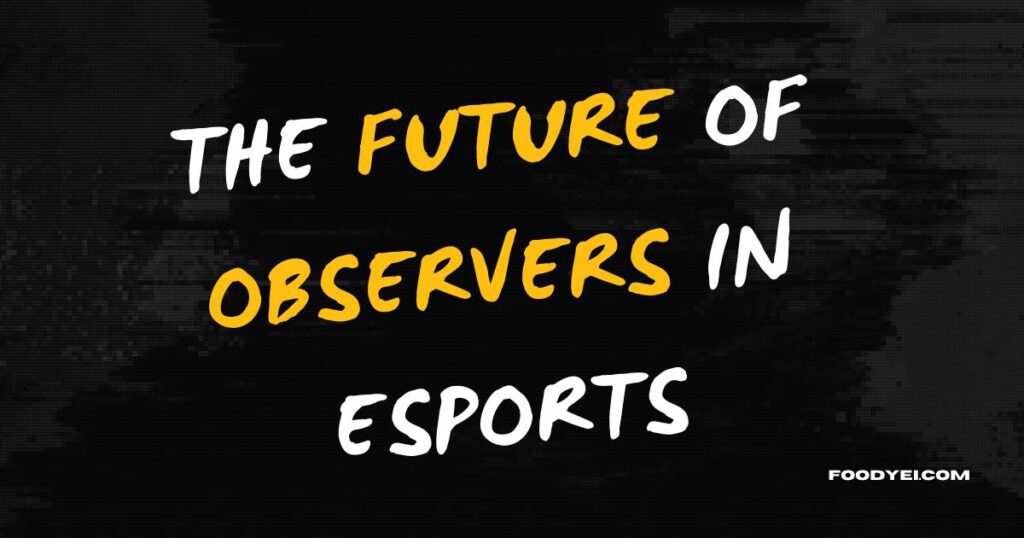
As the esports industry continues to thrive, observers will play an increasingly vital role in shaping the viewer experience. The demand for highly skilled observers is expected to rise, leading to specialized training programs and dedicated career paths. Furthermore, technological advancements, such as virtual reality and augmented reality, may offer new avenues for observers to enhance the immersion of esports broadcasts.
Conclusion:
Esports Observers are the unsung heroes of the esports industry, enriching the viewing experience and ensuring the competitive integrity of events. Their expertise, attention to detail, and ability to capture the essence of the game contribute significantly to the success of esports broadcasts. As esports continues to captivate millions worldwide, observers will remain a fundamental part of the ever-evolving landscape of competitive gaming.
FAQs
Q1: How can I become an esports observer?
To become an esports observer, start by gaining a deep understanding of the games you wish to observe. Practice observing matches, capture noteworthy moments, and compile a portfolio of your work. Network with professionals in the industry, showcase your skills, and seek opportunities to observe at smaller tournaments to gain experience and build your reputation.
Q2: What skills are essential for an observer in esports?
Essential skills for an esports observer include game knowledge, multitasking ability, situational awareness, communication skills, technical proficiency with observation tools, and a keen eye for capturing key moments.
Q3: Can observers impact the outcome of an esports match?
No, observers cannot directly impact the outcome of an esports match. Their role is to observe and capture gameplay, ensuring a fair and engaging viewing experience for the audience.
Q4: Do observers work exclusively in live events, or are there other opportunities for them?
Observers are involved in both live events and online broadcasts. They may also contribute to content creation, such as highlight reels and analysis videos, providing additional value to the esports community.
Q5: How are observers compensated for their work in esports?
Observers’ salary varies depending on the event, their years of experience, and the organization they’re employed for. Compensation may comprise a combination of fees, contracts, and other perks arranged between the observer and the participating parties.


